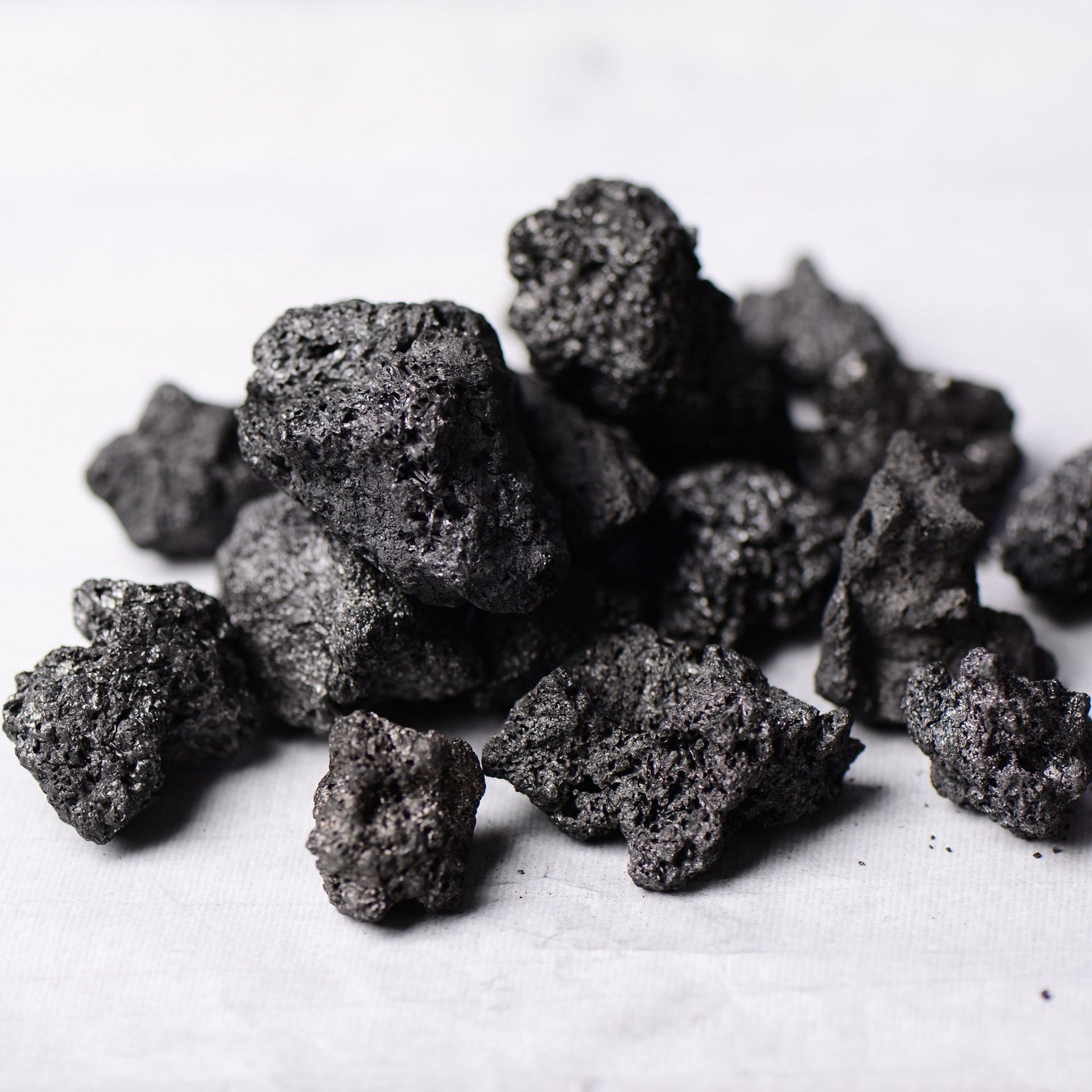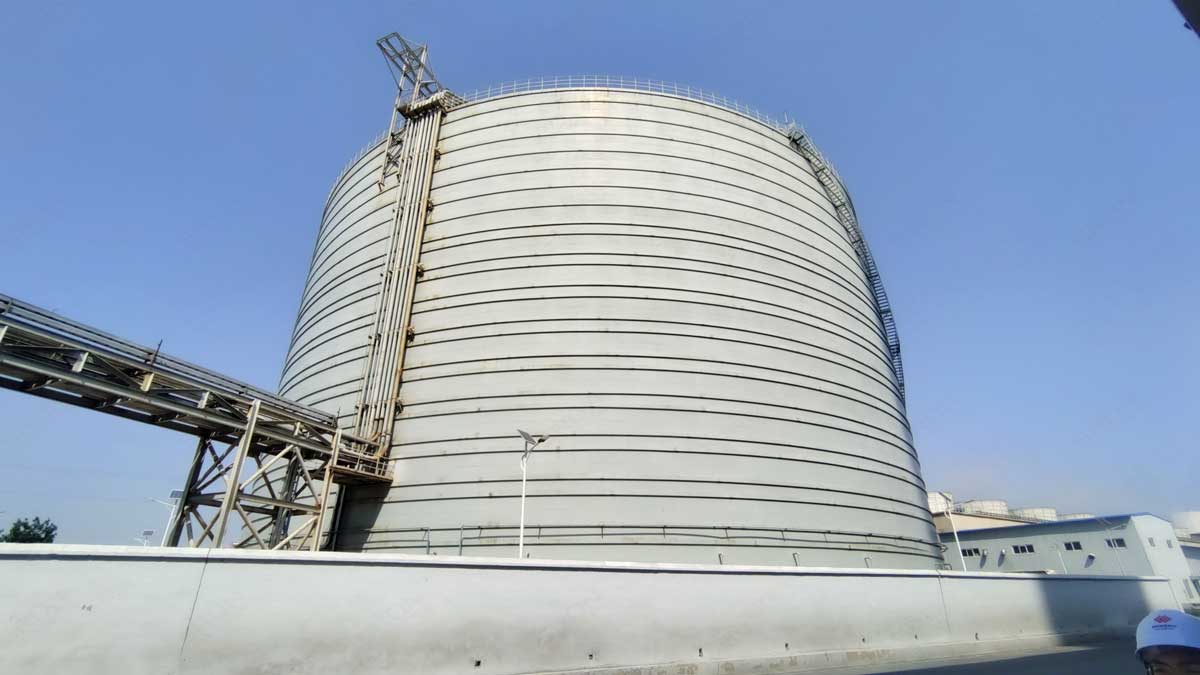Why choose steel silos to store petroleum coke?
Petroleum coke, is a carbon-rich solid substance produced during the crude oil refining process. It is usually a by-product of the refining process, produced when heavy crude oil is processed into gasoline, diesel and other refined products. As an important by-product of the oil refining process, petroleum coke is widely used in many fields such as metallurgy, chemical industry, carbon and cement. With the continuous increase in the annual output and circulation of petroleum coke, how to achieve efficient, safe and environmentally friendly storage of petroleum coke has become a practical problem that many companies need to solve urgently.
Among the many storage methods, the storage of petroleum coke in steel silos has gradually become a new trend in the industry. With its unique structural advantages and application performance, petroleum coke steel silos not only improve storage efficiency, but also optimize the economic and environmental performance of corporate operations.

Characteristics of petroleum coke
Petroleum coke is a solid fuel with high carbon content, high calorific value and low ash content. According to different processing methods, petroleum coke can be divided into various types such as sponge coke, needle coke, spherical coke and delayed coke. Its physical properties put forward the following requirements for storage methods:
Easy to absorb moisture and oxidize: If petroleum coke is exposed to the air, it is easy to absorb moisture and agglomerate, and even spontaneously combust;
Dust is easy to fly: Dust is easy to form during loading and unloading, polluting the environment and endangering the health of operators;
Easy to produce pollutants: Petroleum coke may contain sulfur, heavy metals and other elements, and improper handling will pose a threat to soil and water bodies;
Long storage cycle and frequent entry and exit: Some companies need long-term reserves, requiring good sealing and fluidity;
Therefore, traditional open-air stacking in yards and simple warehouse storage have gradually exposed many defects. The rise of steel silos just meets the multiple needs of petroleum coke for modern, professional and environmentally friendly storage.

Steel Silo VS Traditional Storage Method: The Advantages are Clear at a Glance
1. Sealed Protection, Fireproof and Moisture-proof and Safer
The steel silo adopts a fully enclosed structure, with rainproof top, moisture-proof bottom, and corrosion-resistant sidewalls, which can effectively isolate the influence of external water vapor and air on petroleum coke. Compared with the open-air stacking mode, it greatly reduces the risk of spontaneous combustion and agglomeration rate, ensuring the stability and availability of petroleum coke.
2. Dust-proof and environmentally friendly, helping green development
Steel silos can be equipped with dust recovery, negative pressure ventilation and other systems during design to effectively control the escape of petroleum coke dust and improve the on-site environment. Especially in the context of stricter environmental protection policies, steel silos provide solid support for enterprises to achieve green warehousing.
3. Small footprint, large capacity, saving land resources
The steel silo has a large storage capacity, with a single warehouse capacity ranging from several thousand tons to tens of thousands of tons, and an area far smaller than traditional bungalow warehouses or open-air yards, freeing up more available space for the factory area.
4. High degree of automation, improved operational efficiency
Modern petroleum coke steel silos are equipped with intelligent monitoring systems, which can monitor the temperature, humidity, material level and gas concentration in the silo in real time. Combined with the automatic feeding and unloading system, it can achieve unmanned and efficient operation, greatly reducing labor costs.
5. Long service life and low maintenance cost
The steel silo is made of high-strength galvanized sheet or carbon steel material, combined with spiral bite or welding technology, with a solid structure, wind and corrosion resistance, and a normal service life of more than 25 years.

Professional structural design of petroleum coke steel silo
In view of the characteristics of petroleum coke such as large number of particles and poor fluidity, the steel silo has been specially optimized in structural design:
Conical bottom structure/multi-point discharge system: avoid accumulation of materials in dead corners and ensure smooth discharge;
Bin top dust removal system: real-time purification and exhaust during loading to reduce dust spillage;
Silo safety monitoring system: ensure that petroleum coke is stored under optimal conditions and warn of abnormal situations;
In addition, some high-end projects will also install CO/CH4/hydrogen sulfide gas monitoring systems to achieve intelligent safety management and control.
.jpg)
How to choose the right petroleum coke silo?
When choosing a steel silo, companies need to consider the following factors:
Capacity requirements: Choose a steel silo of appropriate specifications (such as 5,000 tons, 10,000 tons, 20,000 tons, etc.) according to the storage capacity of petroleum coke.
Material selection: Anti-corrosion galvanized steel plates or stainless steel plates are preferred to ensure long-term durability.
Supporting systems: such as ventilation systems, temperature monitoring, dust removal equipment, etc., to improve storage safety.
.jpg)
From the perspective of initial investment, the construction cost of steel silos may be slightly higher than that of simple warehouses or open-air yards. However, if comprehensively calculated from aspects such as service life, labor input, environmental penalties, and land use costs, its overall operating cost is lower and the payback period is shorter. With the continuous advancement of the "carbon peak and carbon neutrality" strategy, the storage methods of high-carbon materials such as petroleum coke will also usher in a major transformation. As a green, efficient and sustainable storage solution, steel silos will evolve in a smarter, more environmentally friendly and more modular direction. As an important energy and industrial raw material, the storage method of petroleum coke directly affects product quality, enterprise costs and environmental benefits. Among the various storage methods, steel silos are gradually becoming the industry's first choice due to their excellent sealing, safety, automation and environmental protection performance.
Among the many storage methods, the storage of petroleum coke in steel silos has gradually become a new trend in the industry. With its unique structural advantages and application performance, petroleum coke steel silos not only improve storage efficiency, but also optimize the economic and environmental performance of corporate operations.

Characteristics of petroleum coke
Petroleum coke is a solid fuel with high carbon content, high calorific value and low ash content. According to different processing methods, petroleum coke can be divided into various types such as sponge coke, needle coke, spherical coke and delayed coke. Its physical properties put forward the following requirements for storage methods:
Easy to absorb moisture and oxidize: If petroleum coke is exposed to the air, it is easy to absorb moisture and agglomerate, and even spontaneously combust;
Dust is easy to fly: Dust is easy to form during loading and unloading, polluting the environment and endangering the health of operators;
Easy to produce pollutants: Petroleum coke may contain sulfur, heavy metals and other elements, and improper handling will pose a threat to soil and water bodies;
Long storage cycle and frequent entry and exit: Some companies need long-term reserves, requiring good sealing and fluidity;
Therefore, traditional open-air stacking in yards and simple warehouse storage have gradually exposed many defects. The rise of steel silos just meets the multiple needs of petroleum coke for modern, professional and environmentally friendly storage.

Steel Silo VS Traditional Storage Method: The Advantages are Clear at a Glance
1. Sealed Protection, Fireproof and Moisture-proof and Safer
The steel silo adopts a fully enclosed structure, with rainproof top, moisture-proof bottom, and corrosion-resistant sidewalls, which can effectively isolate the influence of external water vapor and air on petroleum coke. Compared with the open-air stacking mode, it greatly reduces the risk of spontaneous combustion and agglomeration rate, ensuring the stability and availability of petroleum coke.
2. Dust-proof and environmentally friendly, helping green development
Steel silos can be equipped with dust recovery, negative pressure ventilation and other systems during design to effectively control the escape of petroleum coke dust and improve the on-site environment. Especially in the context of stricter environmental protection policies, steel silos provide solid support for enterprises to achieve green warehousing.
3. Small footprint, large capacity, saving land resources
The steel silo has a large storage capacity, with a single warehouse capacity ranging from several thousand tons to tens of thousands of tons, and an area far smaller than traditional bungalow warehouses or open-air yards, freeing up more available space for the factory area.
4. High degree of automation, improved operational efficiency
Modern petroleum coke steel silos are equipped with intelligent monitoring systems, which can monitor the temperature, humidity, material level and gas concentration in the silo in real time. Combined with the automatic feeding and unloading system, it can achieve unmanned and efficient operation, greatly reducing labor costs.
5. Long service life and low maintenance cost
The steel silo is made of high-strength galvanized sheet or carbon steel material, combined with spiral bite or welding technology, with a solid structure, wind and corrosion resistance, and a normal service life of more than 25 years.

Professional structural design of petroleum coke steel silo
In view of the characteristics of petroleum coke such as large number of particles and poor fluidity, the steel silo has been specially optimized in structural design:
Conical bottom structure/multi-point discharge system: avoid accumulation of materials in dead corners and ensure smooth discharge;
Bin top dust removal system: real-time purification and exhaust during loading to reduce dust spillage;
Silo safety monitoring system: ensure that petroleum coke is stored under optimal conditions and warn of abnormal situations;
In addition, some high-end projects will also install CO/CH4/hydrogen sulfide gas monitoring systems to achieve intelligent safety management and control.
.jpg)
How to choose the right petroleum coke silo?
When choosing a steel silo, companies need to consider the following factors:
Capacity requirements: Choose a steel silo of appropriate specifications (such as 5,000 tons, 10,000 tons, 20,000 tons, etc.) according to the storage capacity of petroleum coke.
Material selection: Anti-corrosion galvanized steel plates or stainless steel plates are preferred to ensure long-term durability.
Supporting systems: such as ventilation systems, temperature monitoring, dust removal equipment, etc., to improve storage safety.
.jpg)
From the perspective of initial investment, the construction cost of steel silos may be slightly higher than that of simple warehouses or open-air yards. However, if comprehensively calculated from aspects such as service life, labor input, environmental penalties, and land use costs, its overall operating cost is lower and the payback period is shorter. With the continuous advancement of the "carbon peak and carbon neutrality" strategy, the storage methods of high-carbon materials such as petroleum coke will also usher in a major transformation. As a green, efficient and sustainable storage solution, steel silos will evolve in a smarter, more environmentally friendly and more modular direction. As an important energy and industrial raw material, the storage method of petroleum coke directly affects product quality, enterprise costs and environmental benefits. Among the various storage methods, steel silos are gradually becoming the industry's first choice due to their excellent sealing, safety, automation and environmental protection performance.






